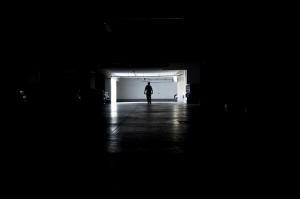Power outage leaves most of Chile in darkness for hours
 [February 26, 2025]
By NAYARA BATSCHKE and MATIAS BASUALDO [February 26, 2025]
By NAYARA BATSCHKE and MATIAS BASUALDO
SANTIAGO, Chile (AP) — Electricity providers across Chile scrambled to
restore service Tuesday after a sweeping blackout plunged 90% of the
country into darkness, stranding commuters, knocking cell service
offline and paralyzing businesses and daily life.
The scale of the power outage appeared to take authorities off guard.
The government declared a state of emergency alongside a mandatory
nighttime curfew that will last until 6 a.m. Wednesday.
“Our first concern, and the reason for this announcement, is to ensure
people’s safety,” Interior Minister Carolina Tohá said in announcing the
exceptional measures. The ministry deployed thousands of soldiers across
the country to help maintain order and enforce the curfew.
Mobile phone services blinkered offline. The world’s largest copper mine
suspended operations. People complained of water shortages as pumps
running on electricity stopped working. Emergency generators helped
hospitals and government offices continue operating.
But the lights — and, on a hot summer night in the Southern Hemisphere,
the air conditioning and fans that keep people cool — began to return in
spurts seven hours after the electric failure first struck. Cheers rung
out on the streets where lights flickered back on.
At around 11 p.m., power was restored to around half of the 8 million
affected households, said President Gabriel Boric.
“What happened today is outrageous,” Boric said in a late-night
televised address. “It's unacceptable that one or several companies
impact the everyday life of millions of Chileans.”

The National Electrical Coordinator, Chile’s grid operator, said a
disruption had occurred in a high-voltage backbone transmission line
that carries power from the Atacama Desert of northern Chile to the
capital of Santiago in the country’s central valley.
The operator's president, Juan Carlos Olmedo, said that the regional
problem started a long-distance chain reaction of overloads and plant
shutdowns until it became a giant blackout that hit 90% of Chile's 19
million people, from the northernmost Chilean port of Arica to the
southern Los Lagos agricultural region.
“The electric system did not operate the way it should have," he said.
The specific cause of the failure remains under investigation. Officials
have ruled out a cyberattack or any kind of criminal activity.
All over Chile, traffic lights darkened, trains stopped and ATMs shut
down. Soccer matches were called off, classes were canceled and concerts
postponed. Police officers and civilians worked together to direct
traffic. Petrol stations were left unable to pump.
[to top of second column]
|

A man walks in a parking garage during a power outage, in Santiago,
Chile, Tuesday, Feb. 25, 2025. (AP Photo/Matias Basualdo)

Businesses, from restaurants and bars to movie theaters, lost money.
Frantic crowds became stranded in stalled subway cars. Older adults
fretted they would not be able to leave apartment buildings because
elevators were out of order.
“Everything has stopped, there's chaos,” said Jorge Calderón, a
writer and resident of Santiago.
Chile’s national disaster response service, Senapred, said the
disruption in the power supply caused an outage across 14 of the
country's 16 regions, including Santiago, a city of some 8.4 million
people, where authorities said there would be no subway service
until further notice.
Tohá said hospitals, prisons and government buildings were using
backup generators to keep essential equipment operating. Officials
evacuated passengers from darkened tunnels and subway stations in
Santiago and elsewhere in the country, including the coastal tourist
hotspot of Valparaiso.
Videos on social media shared from across Chile, a long ribbon of a
country stretching 4,300 kilometers (over 2,600 miles) along the
southern Pacific coast, showed mass confusion at intersections as
traffic lights failed, people having to use their mobile phones as
torches in the underground metro and police dispatched to help
evacuate buildings.
Transport Minister Juan Carlos Muñoz urged people to stay home,
saying it’s “not a good time to go out since we have a transport
system that is not operating normally" with just a fraction of the
traffic lights functioning nationwide.
Authorities at Santiago International Airport said terminals had
switched to emergency power but warned that “some flights could be
impacted.”
Some copper mines in the Andean nation shut down for lack of
electricity while others used auxiliary power to continue
operations. The world’s biggest copper producer, state-owned mining
company Codelco, said the power outage had “affected all
operations,” without elaborating.
___
Batschke reported from Sao Paulo. Isabel DeBre in Buenos Aires,
Argentina, contributed to this report.
All contents © copyright 2025 Associated Press. All rights reserved
 |